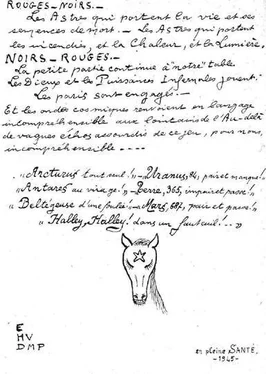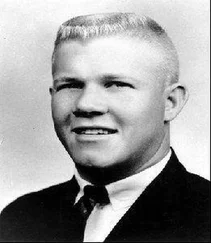Béranger, he added, “told me that he had been present at a meeting when a German figure gave the order to de Brinon to quash the affair from the French police point of view.” The German leader was not identified. Neither Béranger nor de Brinon would ever admit to interfering with the Petiot investigation. After the Liberation, when both men stood trial for collaboration with the enemy, it is not surprising that they would deny taking any action that blocked the arrest of the suspected serial killer.
The time Suard first heard of the German intervention—late April—moreover coincides with a sudden media silence on the Petiot case. Immediately before that, the press speculated on his whereabouts, ending with a noticeable spike in stories of witnesses reporting that the physician had been captured or found dead. On April 21, the Nazi Transocean News Agency asserted that Spanish authorities had arrested Petiot after “a vain flight across the French frontier into Spain” and handed the fugitive over to the police at Bordeaux.
Interestingly, Commissaire Massu always denied that the Germans had hindered his investigation, claiming only that the French police had to file daily reports on the affair and never received any reaction to them whatsoever. But Massu was not privy to decisions made in the upper echelons of the Occupation authorities. Count Fernand de Brinon, Vichy’s ambassador to the occupied zone, answered to the German authorities and gave orders to the prefect of police, Amédée Bussière, who was, in turn, Massu’s supervisor. Not surprisingly, too, Massu carefully denied German interference but not French.
But why would Occupation authorities want to block the investigation? There was still no obvious answer. Likely, though, the ramifications would strike at the heart of the messy, complicated Petiot case, and any unraveling of the mystery would indeed, as the chauffeur said, have to wait until after the Germans left Paris.
BY late July 1944, Allied armies had finally broken through Nazi defenses in the bocage of northwestern France. Caen had fallen not after one day, as planned, but fourteen, and then the Allies conquered a pile of ruins. As Montgomery’s Twenty-first Army continued moving slowly, methodically eastward from Caen, Patton’s Third Army was nearing the Seine, just southeast of the capital. The question for the Allies was whether to head straight for Paris to liberate the city or race to the Rhine with the hopes of reaching Berlin as soon as possible.
At the forward post of the Supreme Headquarters Allied Expeditionary Forces (SHAEF), then located about two miles inland from the Normandy beachhead at Granville, on the Cotentin Peninsula, General Dwight D. Eisenhower wanted to postpone the Liberation of Paris. The top priority, in his assessment, was defeating the Nazis. Paris, by contrast, fulfilled no overall strategic or tactical objective. Besides, the German army had comparatively few troops in the capital; the Allies could always liberate it later. Eisenhower did not want to provoke unnecessary street fighting, potentially wreaking untold destruction and creating a Stalingrad on the Seine. Never mind the logistical nightmare of supplying the minimum four thousand tons of material daily to feed and fuel a city of two million people, when dwindling supplies of gasoline could be marshaled for a direct attack on Germany.
Charles de Gaulle disagreed. In addition to disarming the launching sites for Hitler’s V-1 flying bombs in northern France, de Gaulle called Paris “the key to France” and pressed for an immediate seizure of the capital for enormous symbolic and humanitarian reasons. There were also political realities. Continued Nazi occupation, he believed, would only play into the hands of his Communist rivals. He already feared that they were plotting an insurrection to seize power themselves.
While he sent representatives to plead his case with Eisenhower, de Gaulle ordered General Pierre Koenig, his chief of staff and the leader of the irregular army of the Resistance, the Forces françaises de l’intérieur (French Forces of the Interior, or FFI), to prevent a revolt from occurring in the city without his consent. The task was difficult. De Gaulle wanted an insurrection, but he did not want to give the Communists a chance to exploit it for their own purposes. He then ordered Philippe de Hauteclocque, better known by his nom de guerre, General Jacques Leclerc, of the French Second Armored Division, under the authority of the US Third Army, to head for Paris. Leclerc was instructed to disobey Patton and Eisenhower if necessary.
Some nine hundred miles away, at the Wolf’s Lair, then Nazi field headquarters in an East Prussian forest, Adolf Hitler had other plans for the city. “Paris must not fall into the hands of the enemy, or, if it does, he must find there nothing but a field of ruins,” Secret memo Nr. 772989/44, of August 23, 1944, informed the commanding general of Greater Paris. To carry out this destruction, Hitler had appointed Dietrich Von Choltitz, a forty-nine-year-old general who was notorious for his hardness, experience, and not least, his ability to follow difficult directives without question. It was Von Choltitz who had given the order in May 1940 to firebomb the inner city of Rotterdam, and then in July 1942, he oversaw the massive destruction in the siege of Sevastopol.
Von Choltitz had arrived in Paris on August 7 to replace General Karl von Stülpnagel, who had been implicated in the failed plot to assassinate Hitler on July 20, 1944. Stülpnagel had in fact arrested the entire SS in Paris. But when word arrived that the Führer had survived, Stülpnagel was recalled to Berlin. Instead of following orders, he hopped into a black Horsch, drove to his old battlefield at Verdun, and tried to blow his brains out. Blinded but still alive, he was captured by German soldiers. Stülpnagel was brought back to Plötzensee Prison in Berlin, where he hanged himself.
While Allied armies succeeded on the fifteenth with a second major landing near Saint-Tropez in southern France, the Gestapo struck at police headquarters, attempting to seize its weapons. The French police rebelled. Under the leadership of several Resistance groups inside the police, particularly the Front national de la police, L’Honneur de la police, and Police et patrie, the police refused to hand over their weapons, and then to patrol the streets—a shutdown that was part of a widening breakdown of city services. Workers in the métro, the railway, the post office, and the Bank of France were also on strike. Electricity, gas, and many other services no longer worked. Then, as Paris threatened to erupt, the police seized the prefecture.
At this time, General de Gaulle was still in Algiers, trying to arrange a flight back to the continent and growing more desperate by the minute. First, the American B-17 that had promised him a flight suffered repeated delays, most recently to fix its landing gear. Then, on August 19, General de Gaulle boarded the Lodestar Lockheed plane France and flew north. The Royal Air Force escort that was supposed to meet him over the Channel was not there. Running low on fuel, the general had to make a decision. The pilot believed that there was perhaps enough fuel to reach France, but it was not certain. The general ordered the pilot to proceed.
The plane landed at a little airfield near Saint-Lô with about two minutes of fuel to spare. Having left as an obscure brigadier general, de Gaulle returned as the leader of the Free French. There was no fanfare. He was welcomed by three people.
That same morning, de Gaulle learned, just as he had feared, that rival Communists had launched an insurrection. Colonel Rol, the nom de guerre of Henri Tanguy, was orchestrating the revolt from his headquarters some ninety feet belowground, in the cellars of the Paris Department of Water and Sewers. This secret location was linked to a maze of catacombs, the old stone quarries, nineteenth-century sewers, and almost the entire Parisian métro system. Rol planned to use this network for quick, decisive acts that would culminate in the seizure of key government buildings. The Communists would then, de Gaulle feared, use the uncertainty of the Nazi retreat to consolidate their control of the postwar world. Alternatively, the Germans would quash the rebellion with a savage massacre.
Читать дальше












